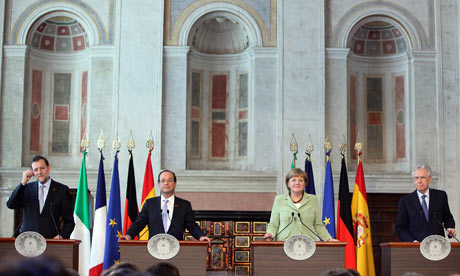Because no elected government would stand a chance of revoking this policy, I will vote against the ratification
Spain's Mariano Rajoy, France's Francois Hollande, Germany's Angela Merkel and Italy's Mario Monti at a media conference in Rome ahead of next week's summit of EU leaders. Photograph: Franco Origlia/Getty Images
Germany's Chancellor Angela Merkel has been key in deciding the course of the European crisis policy. The fiscal treaty and the European stability mechanism (ESM) are an attempt to dictate this policy indefinitely to the countries in Europe. This strategy, however, ignores two fundamental facts. First, it was only after the worldwide financial crisis in 2008 that the state debts started rising. They did so because of a global recession and the bank rescue packages. It is not true that European countries had been living beyond their means. Second, Merkel's crisis policy ignores the fact that high spending cuts have a negative impact on economic growth.
At worst, this kind of policy leads to a recession. In Greece this policy has been carried to extremes. In recent years the Greek economy has slumped by 20%. This usually happens only in wartime. Youth unemployment in Greece, like in Spain, now runs as high as 50%. The result is a steep decline in tax revenues which leads to a mounting increase of the Greek state debt despite all spending cuts. This policy, in the meantime, has driven the entire eurozone into a recession. The EU commission predicts negative growth for 2012.
Enforcing the fiscal treaty in a situation like this would coerce the whole of Europe into budget cuts for decades and by so doing would permanently strangle economic growth. No country in the eurozone – with the exception of Finland and Estonia – would have fulfilled the criteria of the fiscal treaty in 2011. This means that 98% of the economy and the population in the eurozone would have been subjected to quasi-automatic budget cuts in 2012, with Brussels controlling their enforcement. The fiscal treaty is an enemy to democracy because no elected government would stand a chance of revoking this policy that has been dictated. The international treaty does not allow for unilateral termination. Infringements would lead to court proceedings before the European court and eventually to penalty payments for the country in question. The fiscal treaty is a scandalous deprivation of the will of the population.
It is odd that it is Germany of all governments that is the driving force behind this madness. After all, it was Germany that at the beginning of the 1930s experienced first-hand how a policy of that kind led our country at first and then the entire world into the catastrophe. A policy lacking all solidarity is also incomprehensible because it is German capital which by means of an aggressive export policy has profited way above average from the common currency ever since it came into force. This is why it is particularly important that Merkel is reminded of her destructive role at every possible occasion. Many by now regard the developments in Europe as a danger for the world economy. The statements of the heads of government at the G20 summit showed this clearly. It is even worse, of course, that this policy divides Europe and destroys the future of the people.
In order to break the vicious circle it is necessary to stop the fiscal treaty and the policy of budget cuts coming along with it. Otherwise all decisions to add growth impulses can only be regarded as fig leaves. Sound public finances cannot be brought about by a fiscal treaty that strangles economic growth and tax revenues. State budgets can only be restored by increasing state income by means of a strict redistribution of wealth. High mounting debts and unevenly spread wealth are two sides of the same problem. It can be resolved by adequately taxing millionaires and high profits. With the fiscal treaty, an alternative policy cannot be enforced for a long time to come, because the treaty explicitly states that budget consolidation through spending cuts is paramount.
This is the reason I am going to vote against the ratification of the fiscal treaty and the permanent rescue scheme in the German Bundestag, together with my parliamentary group Die Linke (The Left). Should the bill pass, which unfortunately is likely because the other opposition parties in the German parliament have yielded their position, we are going to take legal action and file suit against the treaties before the German constitutional court.

No comments:
Post a Comment